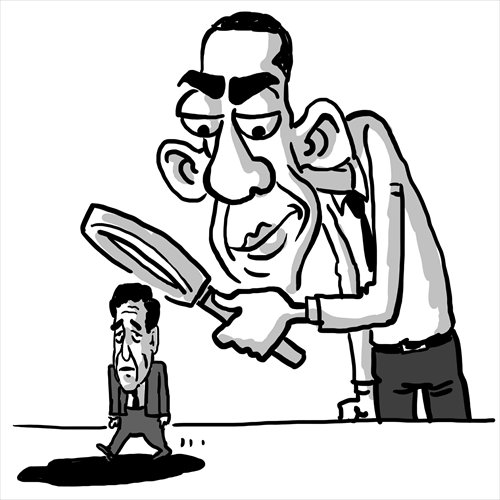 The 4th Chinese National Pole Dance Championship held in Tianjin
The 4th Chinese National Pole Dance Championship held in Tianjin
 Chinese navy commandos debut at 2014 RIMPAC
Chinese navy commandos debut at 2014 RIMPAC
 Guangxi impression: scenic countryside
Guangxi impression: scenic countryside
 World's largest aquatic insect found in Sichuan
World's largest aquatic insect found in Sichuan
 Ceremony volunteers for Youth Olympics make public appearance
Ceremony volunteers for Youth Olympics make public appearance
 A glimpse of female crew of Liaoning aircraft carrier
A glimpse of female crew of Liaoning aircraft carrier
 Stills from "Dad, where are we going?"
Stills from "Dad, where are we going?"
 Legless man's happy life
Legless man's happy life
 Top ten most beautiful islands in China
Top ten most beautiful islands in China
 Aerial view of Hong Kong
Aerial view of Hong Kong
 |
| (Illustration: Liu Rui/GT) |
There is an increasing possibility that Japanese Prime Minister Shinzo Abe will visit North Korea. US Secretary of State John Kerry warned against Japan's overtures during a telephone conversation with his Japanese counterpart Fumio Kishida earlier this month.
The Japanese government announced to ease sanctions on North Korea in exchange for the latter's launch of a new organization to reinvestigate the abductions of Japanese citizens. And Tokyo has been considering a visit by Abe himself, not only to help resolve the issue but also to mitigate North Korea's isolated status.
Kerry was quoted as saying that it would not be good to see Japan move forward alone and that Japan should have sufficient prior consultations with the US rather than just informing Washington at short notice if Abe considers a trip to North Korea.
Kerry also expressed displeasure with Tokyo unilaterally removing some of its sanctions on the North.
Apparently, the recent warming of Tokyo-Pyongyang ties has become a thorn in the side of Washington, which worries such a development will hurt trilateral efforts by the US, Japan and South Korea to pressure the North over its nuclear and missile program.
Abe was elected prime minister for the first time in 2006 largely due to his tough attitude toward North Korea. But then US secretary of state Condoleezza Rice adopted a relatively favorable policy toward the North. Rice inked a document officially deleting North Korea from the US list of state sponsors of terrorism, in a bid to salvage a nuclear disarmament deal. This dealt a heavy blow to Tokyo.
Now the situation has changed. The escalated tensions in the Middle East and Ukraine have hindered Washington's effort to tackle the North Korean nuclear issue. And seeing increasingly intimate relations between China and South Korea, Abe's cabinet has started to reach out to the North independently and revoke some sanctions including travel restrictions.
Nevertheless, Washington has been seeking to impose more pressure on Pyongyang by stepping up cooperation with its two Asian allies. Therefore, it seems that Japan has never been keeping the same pace as its US ally over North Korea.
The brewing kidnapping case has become an intractable knot blocking the development of Japanese-North Korean relations. Japanese prime ministers in recent years all attempted to gain public favor by making some progress in addressing the abduction issue.
But with the rapid turnover of leaders, the North saw no need to address the issue. Now Abe seems set to have a longer premiership, and the North has begun to take a more serious interest in Japan's overtures.
Analysts believe that North Korea is getting closer to Japan because it wants to foment dissension within Washington's Asian alliance. In addition, it attempts to solicit Beijing's attention as the new Chinese leadership broke a long-held tradition by visiting Seoul instead of Pyongyang during President Xi Jinping's maiden trip to the Korean Peninsula.
On the other hand, the approval rate for Abe hit a record low in July largely due to his decision to give green light to the collective self-defense policy. He urgently needs to rebuild his image and win back domestic support.
There is no denying that both sides lack fundamental trust in each other. But their closer ties have infuriated the US, which has recognized Abe's ambitions.
The Obama administration has been watching Tokyo unbinding itself from previous restraints step by step. This time Washington directly warned Japan for getting closer to the heavily sanctioned North.
Japan is likely to make compromises to the US over the Trans-Pacific Partnership Agreement negotiation and some other spheres in exchange for more diplomatic independence. However, Washington's warning or control may no longer pan out once Japan breaks away from all the constraints imposed on it in the postwar era.
At the moment, the disagreement between the US and Japan toward North Korea, though it may not force Abe to relinquish power, will push the two further apart.
 Zhujiang ambassadors attend lotus lanterns activity
Zhujiang ambassadors attend lotus lanterns activity
 From girly girl to tough special police officer
From girly girl to tough special police officer
 Children attend gymnastics training in summer
Children attend gymnastics training in summer
 Beautiful sceneries along the special travel route in Xinjiang
Beautiful sceneries along the special travel route in Xinjiang
 Focus on 1st female patrol team in Turpan
Focus on 1st female patrol team in Turpan
 Collection of 'China Dream' public-spirited ads
Collection of 'China Dream' public-spirited ads  National fitness team members integrate traditional and modern beauty
National fitness team members integrate traditional and modern beauty Moms on their kid’s coming out
Moms on their kid’s coming out Chinese fighters through lens
Chinese fighters through lens
 48 hours after super Typhoon Rammasun
48 hours after super Typhoon Rammasun Bikini show held at water park in Xi'an
Bikini show held at water park in Xi'an
 Lobster vs cat: catch me if you can
Lobster vs cat: catch me if you can  Heat waves sweep China
Heat waves sweep China  Top 10 most beautiful islands in China
Top 10 most beautiful islands in China
 Zhou Xun announces engagement to Archie Gao
Zhou Xun announces engagement to Archie Gao
Day|Week|Month